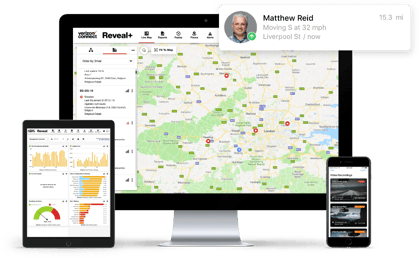9 Secrets to Reducing your Fleet Expenses
As a fleet owner, your day-to-day costs can quickly add up. What you don’t know is there are further hidden, expensive...
Read more
The majority of UK fleet-reliant businesses now use some form of GPS fleet management system to monitor staff location and behaviour, drive efficiency and keep a handle on costs.
For those that don’t, the experience of running a fleet will be vastly different. Without access to the best available fleet management tools, it can be difficult to efficiently track, route and run a busy fleet.
This is because modern GPS fleet management systems can potentially touch and improve every business function – from routing and dispatch to customer service and maintenance.
If you’re not making use of the latest GPS technology to run and manage your fleet, here’s what you could be missing out on.
For those without a comprehensive solution, routing can be a manual and potentially complex process. While it is straightforward enough to allocate stops in chronological order, without the helping hand of technology, it is not always easy to select the most efficient routes.
A similar problem arises as jobs are added or removed throughout the working day. Without an effective system in place, dispatch needs to contact drivers by phone or text and deliver new routing instructions manually.
With GPS technology in place…
Automatically route your day’s drops in the most efficient order, helping to reduce excess mileage and time spent behind the wheel. When planning routes, your system should consider factors such as traffic to ensure your drivers always take the most efficient route possible.
When adding new jobs to the working day, GPS fleet management software allows you to quickly find and re-route the nearest driver to a given location. New routing instructions can then be sent directly to the driver in question with no need for a phone call.
Payroll, timesheets and billing have been traditionally laborious processes. Not only do they take time but, when completed manually, they are also open to human error.
An incorrect timesheet could result in inaccurate billing and over or underpaying your staff, which as well as an inconvenience could also lead to damage to your company reputation and poor staff and customer satisfaction.
With GPS technology in place…
Modern GPS fleet management systems track important events such as site arrival/departure time and engine on hours. These milestones can be used to automate the timesheet, billing and payroll process – potentially saving you both time and money.
Find the right solution for your business with our free Fleet Management Buyer’s Guide.
With site arrival and departure time recorded to the minute, you can be sure that your billing is as accurate as possible. And with timesheets logged automatically, you’ll never over or underpay your staff again.
Though you may have a comprehensive safety policy in place, without GPS tracking it’s practically impossible to verify that it is being adhered to when out on the road.
Behaviours such as speeding and reckless driving often go unspotted and should an accident occur, it can be difficult to ascertain who is at fault.
The same is true of fleet security. With your vehicles out on site or at drivers’ houses overnight, it can be difficult to protect against theft and unauthorised use.
With GPS technology in place…
GPS fleet management technology can be used to monitor instances of poor driving – such as speeding, late braking and harsh acceleration. This information can then be used to create a driver scorecard and rank staff members on their driving style. The safer the driver the higher they climb in the safety rankings. This approach has been shown to improve fleet safety and reduce the risk of accidents.
A GPS system can also alert you to theft and unauthorised use. Geofences can be set to alert you whenever a vehicle is operated in an unauthorised location and in the event of theft, location data can be used to help you track and recover stolen assets.
Maintenance can be a major headache for business owners and fleet managers. Almost a third of fleet-reliant business owners say that maintenance is the number one concern that keeps them awake at night while 12% say it is the task that takes up most of their time.
When managed manually, maintaining a fleet can be a time-consuming task. Without tracking the condition of your vehicles and relying solely on routine servicing dates, you could be placing unnecessary strain on your fleet. Minor problems that may go unnoticed could quickly require major, and costly, repairs.
With GPS technology in place…
GPS fleet management technology allows you to take a proactive approach to fleet maintenance. By monitoring behaviours such as idling and speeding, which can both increase wear and tear on the engine, you can keep track of vehicle condition as well as coach out potentially damaging driving styles.
You can also use GPS fleet management technology to set reminders, based on time or mileage, so that you do not miss a service or routine repair. This proactive approach to maintenance has been shown to improve MPG and reduce fuel costs.
To see what your business could look like with the help of GPS fleet management technology, book in for a free live demo.
Tags: All




Find out how our platform gives you the visibility you need to get more done.
As a fleet owner, your day-to-day costs can quickly add up. What you don’t know is there are further hidden, expensive...
Read moreVerizon Connect Reveal tracks the fleet data that can have a big impact on your business. These are things like where...
Read moreAt Verizon Connect, we can only provide the highest possible level of service to fleet managers and business owners by...
Read moreReveal tracks the fleet data that can have a big impact on your business. These are things like where your vehicles are...
Read more